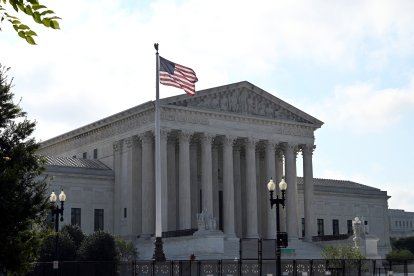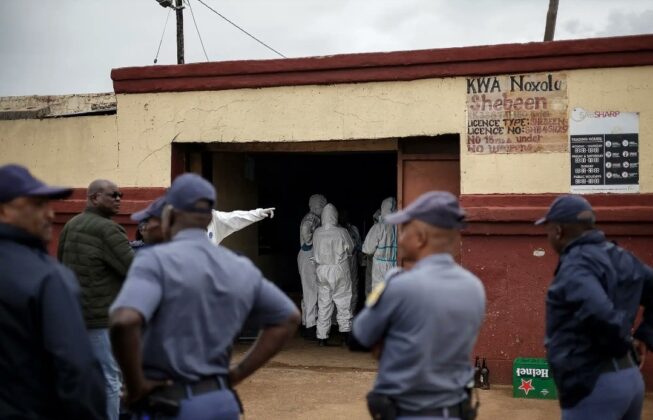
U.S. Supreme Court on Friday blocked the administration from moving forward with deportations under the 1798 Alien Enemies Act, siding with a group of Venezuelan migrants held in northern Texas who feared imminent removal.
In a biting loss for United States President Donald Trump’s immigration agenda, the U.S. Supreme Court on Friday blocked the administration from going ahead with deportations under the 1798 Alien Enemies Act, in a ruling in favor of a group of Venezuelan migrants being held in northern Texas who had feared near-term expulsion.
The unsigned majority opinion halts the enforcement of the centuries old war time law for the time being — as suits are pending in lower courts challenging its constitutionality along with the detainees’ procedural rights. The case now goes back to the 5th U.S. Circuit Court of Appeals for reconsideration.
The court was clear that the stakes are very high, referring to an earlier case where a Venezuelan man was erroneously sent to a Salvadoran jail. Using strong language, the justices rebuked the Trump administration and U.S. District Judge James Hendrix, accusing the district court of doing nothing as migrants were experiencing “deep, irreparable harm.”
The detainees’ interests that are stake are therefore unusually weighty,” the court stated, alluding to the government’s failure to return the wrongly deported individual and the insufficient 24-hour notice given to others, which lacked any mention of legal rights or how to appeal against their removal.
The order, which extends a previous emergency order issued on April 19, effectively enjoins all deportations under the Alien Enemies Act pending rulings by the courts of its legality and the extent of due process owed to those targeted under it.
Two conservative justices, Samuel Alito and Clarence Thomas, dissented from the decision. In a sharp 14-page dissent, Alito criticized the court’s intervention, stating that it was exceeding its power by stepping in before the case had been fully resolved in the lower courts.
“This court has forged a new path,” Alito wrote. “To my eyes, that seems very much like an expansion of our original jurisdiction.”
Justice Brett Kavanaugh concurred with the majority but insisted the court should have taken the entire case immediately, considering the emergency status of the legal questions and the executive branch’s request for a prompt ruling.
The Trump administration invoked the Alien Enemies Act in March to speed up the deportation of Venezuelan nationals accused of ties to the violent Tren de Aragua gang. Hundreds were placed on airplanes and deported to El Salvador before courts began intervening.
The American Civil Liberties Union (ACLU), representing some of the detainees, has filed several petitions of habeas corpus alleging the administration had violated due process rights. New York, Texas, Colorado, and Nevada courts have since issued various injunctions, with some of the judges stating that Trump’s invocation of the act — originally designed for enemies during times of war in the event of actual invasion — exceeded its legal mandate.
This decision will mean that more individuals will not be secretly sent back to a notorious El Salvadoran prison,” said Lee Gelernt, the ACLU’s principal lawyer on the case. “The use of the Alien Enemies Act by the administration during a time of peace, without due process, raises issues of broad importance.”.
In filings with the court, Solicitor General D. John Sauer had argued that detainees received adequate notice and a chance to bring legal action, debunking plans for immediate deportation. The ACLU, however, provided the court with documentation that the migrants received only English-language notices without legal representation and had fewer than 24 hours to reply – an argument that appeared to concern the justices.
The government also claimed the detainees were becoming a threat. Sauer told 23 migrants had locked themselves in their detention block and attempted to wreck the center, pointing to what he called “serious difficulties” in continuing to detain them.
President Trump reacted to the ruling on social media by excoriating the court: “THE SUPREME COURT WON’T LET US GET CRIMINALS OUT OF OUR COUNTRY!” he tweeted. In a follow-up tweet, he called the ruling “a bad and dangerous day for America.”.
The legal battle over the Alien Enemies Act is far from over. The 5th Circuit must now determine whether the president’s invocation of the act is lawful and, if so, what procedures must be in place so that the affected individuals are dealt with justly.
Steve Vladeck, a professor of constitutional law at Georgetown Law, noted that the ruling is a stay, not a finality. “Because lower courts have enjoined application of the act in every other district where the president has sought to invoke it,” he stated, “this order effectively blocks all removals under the law until its legality is resolved.”
The case highlights the growing conflict between executive power and judicial oversight, particularly where national security claims run up against individual rights. As the courts weigh those interests, hundreds of Venezuelan migrants remain in legal limbo — shielded, for now, from deportation under a law not invoked since World War II.



